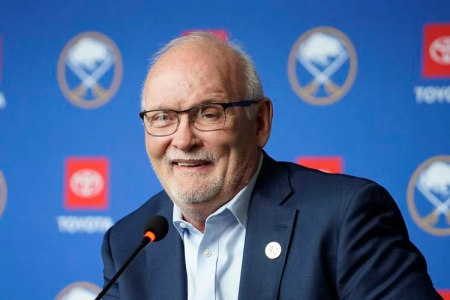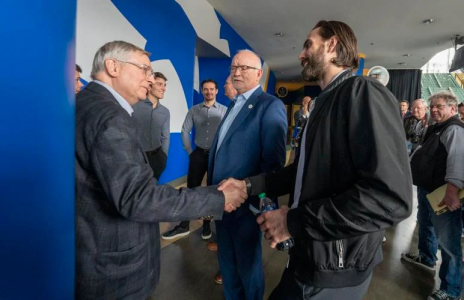
Lindy Ruff motivated to take Sabres to 'next step' in second stint as head coach
"I’m a risk-taker. And I think if there’s no risk, there’s no reward. So, I’m putting myself in that position,” Lindy Ruff said as he was introduced as the new Sabres head coach.
Lindy Ruff didn't say yes right away when Kevyn Adams offered him the role as head coach of the Buffalo Sabres.
Ruff lost his job only six weeks earlier because the New Jersey Devils failed to meet or exceed the expectations created by a 112-point regular season and appearance in the second round of the Stanley Cup Playoffs.

Lindy Ruff speaks as he is reintroduced as the new Sabres head coach on Tuesday. Harry Scull Jr., Buffalo News
Even though Ruff has owned a home in Buffalo since his playing career began here in 1979 and spends his summers in Western New York, he questioned whether he was willing to commit to another team that had just fired its head coach under similar circumstances.
The 64-year-old was driven to coach again. But first, he needed to hear more details from Adams, the Sabres’ general manager who was an assistant coach under Ruff for parts of two seasons from 2011-13.
“I was questioning myself,” Ruff acknowledged Tuesday in the KeyBank Center. “You know, why would I do this? Then I came to a point, why wouldn’t I? Because I’m a risk-taker. And I think if there’s no risk, there’s no reward. So, I’m putting myself in that position.”
Few in the history of the Sabres understand the reward in Buffalo. The opportunity to return to the job that he held for 15 seasons was too much to pass up, and he was announced as Don Granato's replacement Monday evening.
The contract that Ruff signed covers the next two seasons, according to industry sources, and coincides with the two years remaining on the extension that Granato signed with the Sabres in October 2022.
“He’s the right person for this job and I truly believe that he is the person that’s going to take us to the next level,” Adams said during his opening statement.
Making his first public comments about the Sabres since 2020, owner Terry Pegula began the re-introductory press conference Tuesday by listing the numerous accomplishments and milestones that Ruff has achieved since he got his first head coaching job with Buffalo in 1997-98.
Beloved in Western New York since his days as a rugged left-shot defenseman, Ruff was behind the Sabres’ bench in 1999 when they lost in Game 6 of the Stanley Cup final on Brett Hull’s controversial goal. Ruff won the Jack Adams Award as the NHL’s best coach in 2005-06. The first of his consecutive trips to the Eastern Conference finals in 2006 was derailed by injuries on defense and their opponent, the Carolina Hurricanes, went on to win the Stanley Cup. Adams was one of the Hurricanes’ alternate captains during that playoff run.
Ruff expressed confidence that he’s a “a lot better” coach than Feb. 20, 2013, when he was fired by Pegula only 17 games into the lockout-shortened season. Ruff’s replacement, Ron Rolston, was let go after 51 games, and the Sabres began to gradually dismantle their roster to try to finish higher in the NHL draft lottery.
Six head coaches have stood behind the Sabres’ bench since Ruff departed 11 years ago. The most recent, Granato, developed several players on the youngest roster in the NHL into reliable contributors. They finished one point behind the final playoff team in the Eastern Conference last season, and their 91 standings points was the best mark during a 13-year playoff drought that’s tied with the New York Jets for the longest in North American professional sports.
The Sabres finished with seven fewer standings points this season though and lost their identity as a prolific offensive team while trying to improve their defensive deficiencies that cost them a spot in the Stanley Cup Playoffs. Their power play dropped from ninth to tied for 28th, and they had a negative-30 goal differential in the first period of games.
Accountability and better practice habits were among the reasons cited by Adams when Granato was fired last week. Players told reporters they were ready for a different approach from an experienced coach. And, once Granato was fired, Adams’ conversations with players convinced him that his second head coaching hire should be someone who has a resume like Ruff’s, which includes 132 playoff games and the fourth-most games coached in NHL history.
“I just kept coming back to the conversations with Lindy,” said Adams. “And as he started to dig in even more on our team and the opportunity that he saw and the potential he saw in this group – I mean, Lindy Ruff would not be sitting up here if he did not believe this team could win. That’s why he’s here. He’s here to win. The past is the past – that’s great. But this is about now. This is about the players in that locker room now. This is about the fans that come in here and can believe in something great. That’s why he’s sitting here.”
Ruff wouldn’t have been a candidate to return to the Sabres if he hadn’t shown an ability to evolve and adapt. The process for him began in 2013 when he decided that his approach had to change after 15 seasons and 571 victories in Buffalo. Once Ruff became head coach in Dallas, he chose to no longer go into the dressing room after each game and that any critique of the Stars’ performance could wait until practice the next day.
Relationship-building has always been an important tool for Ruff, but he understood that athletes were changing. Yelling wasn’t always the path to pushing a player to improve. He also saw that a consistent message was important to them. At the Sochi Winter Olympics in 2014, Ruff collaborated with fellow coaches Mike Babcock, Ken Hitchcock and Claude Julien to have Canada play a stronger defensive game. Ruff saw firsthand how a responsible game plan can lead to more offense when you have highly skilled players.
“The game has changed so much,” he said. “Lindy Ruff has changed so much.”
His three seasons as an assistant coach with the New York Rangers from 2017-20 was a chance to spend more time around players after practice and learn how to motivate them. Even something as simple as players’ preference to communicate through text message instead of phone calls became useful to Ruff once he took the head coaching job with the Devils in 2020.
Ruff embraced analytics when NHL teams began to urge their coaches to use the data when making lineup and in-game decisions. And the Devils’ success last season illustrated that more can be expected from Ruff’s teams than playing shutdown defense and relying on strong goaltending.
New Jersey had its best regular-season finish in franchise history by improving from 27-46-9 in 2021-22 to 52-22-8 in 2022-23, the latter of which included a first-round playoff series win over the New York Rangers.
“I think we had a heck of a year a year ago, and it was just the right time for that group,” said Ruff. “I might be sitting here being one of the luckiest coaches because this might be the right time where all these guys take that next step.”
Several factors led to the Devils firing Ruff only a few months after he signed a contract extension. They lost two of their top defensemen in free agency last summer, then their top player on the blue line, Dougie Hamilton, suffered a season-ending injury in November. Jack Hughes, their franchise cornerstone, missed 16 games because of injury. Timo Meier, their trade-deadline acquisition last season, struggled under Ruff and missed 13 games.
New Jersey was 30-27-4, ranked ninth in goals per game and, according to Natural Stat Trick, sat sixth in the NHL in 5-on-5 expected goals for when General Manager Tom Fitzgerald fired Ruff last month. The young defense corps struggled with Hamilton and Jonas Siegenthaler out. The Devils were the seventh-youngest team in the NHL this season.
The roster is like the one Ruff will have in Buffalo. He expressed excitement about the Sabres’ goaltending, led by Ukko-Pekka Luukkonen and Devon Levi, and a deep defense corps that includes a pair of No. 1 draft picks, Rasmus Dahlin and Owen Power.
“The style of play, we’ll try to play a real fast game,” said Ruff. “Use you speed and use your talent. Every player has something to offer, and a different skill set, but use that skill set to make us the best offensive team. We really had a team that had defense that were involved with the play to help a great offense. That’ll be a big part of it.”
The challenges in Buffalo are different than any Ruff experienced in Dallas, New York or New Jersey. They’re nothing like the circumstances Ruff faced during his final season with the Sabres, either.
Fans are tired of heeding the franchise’s calls for patience. Average attendance at KeyBank Center (15,981) as the third-lowest mark in the league, not counting Arizona, which played in a 4,600-seat arena. Local television ratings dropped. Several of the Sabres’ players, including franchise pillars like Rasmus Dahlin, Owen Power, Tage Thompson and Dylan Cozens, have never experienced the Stanley Cup Playoffs.

Sabres owner Terry Pegula, left, greets Alex Tuch as Lindy Ruff looks on Tuesday. Tuch is excited to play for Ruff. Harry Scull Jr., Buffalo News
Alex Tuch, Connor Clifton, Jacob Bryson and Peyton Krebs sat in the second row of the press conference as Ruff fielded questions. He understands better than most what Buffalo is like when the Sabres are winning. He experienced it in 10 seasons as a player and 10 as head coach.
As Ruff recounted the building shaking after the Sabres eliminated the Flyers in the first round of the 2001 Stanley Cup Playoffs with an 8-0 win, he looked over to his new players and said: “My goal is to have these guys, this group, experience what I was able to experience.”
